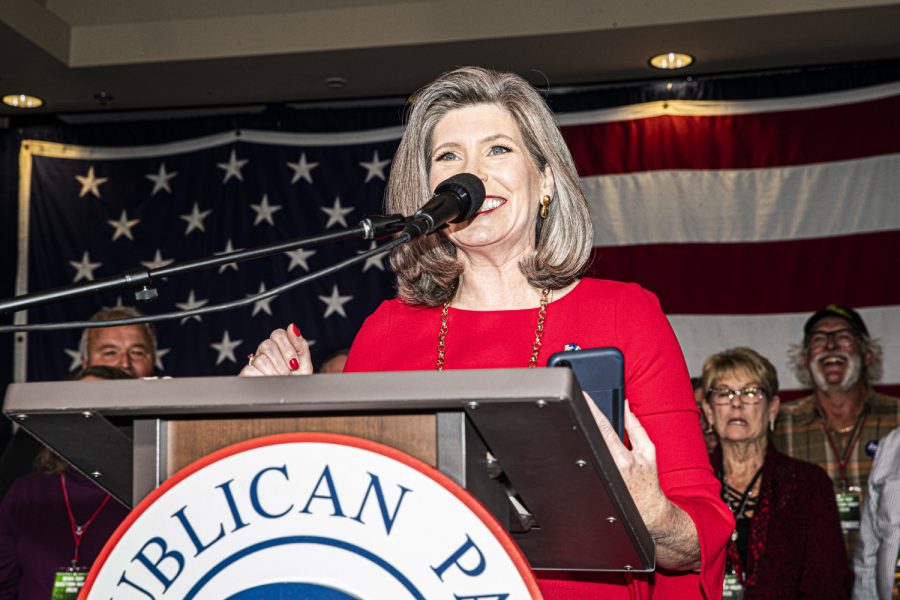Independents, economy drove Republican wins Tuesday night
Republican voters in Iowa credited high economic marks before the pandemic is a reason they voted for President Trump, and independents turning out for Trump led to wins for Republicans down the ballot.
U.S. Sen. Joni Ernst R-IA speaks at the republican watch party at the Des Moins Marriott Downtown on Tuesday, November 3rd, 2020 . Republicans from across the state have gathered to watch the results of the 2020 General Election.
November 5, 2020
Brad Drazner, a University of Iowa student originally from Illinois who voted in Iowa City, was excited to cast his vote on Tuesday in a swing state, saying that coming from traditionally Democratic Illinois meant he wouldn’t have much sway over the state’s presidential pick.
Drazner, 21, cast his votes for President Trump and the other Republican candidates on the ballot, though he said he hadn’t done as much research on the down-ballot races.
“I’ve just seen what he’s done in office in the last four years, seen what he’s done in the unemployment rate,” he said. “…and I know it’s not a very popular vote, but it’s what I’ve grown up as, and what I’ve grown up with.”
Drazner was one of the nearly 900,000 Iowans that voted for Trump — both on Tuesday and in early ballots — which pushed him to a win over Democratic candidate Joe Biden in the Hawkeye State. Trump’s success Tuesday night trickled down to other Republican candidates, carrying Sen. Joni Ernst to victory in the Senate and Republican Ashley Hinson to a win in Iowa’s 1st Congressional District.
Republican Mariannette Miller-Meeks currently leads by less than 300 votes in the 2nd Congressional District, but the race is too close to call and Democrat Rita Hart has not conceded. Democrat Cindy Axne held her seat in the 3rd District against Republican David Young, but by a smaller margin than she won in 2018. Republican Randy Feenstra won handily over Democrat J.D. Scholten in the 4th District.
RELATED: Joni Ernst defeats Theresa Greenfield in race for U.S. Senate seat from Iowa
Trump voters interviewed by The Daily Iowan on Tuesday listed the pre-pandemic economy, including low unemployment and high stock market performance, as reasons they voted to reelect the president. Others said his pro-life stance and tough-on-crime rhetoric swayed their decision.
Republicans in Iowa outperformed many people’s expectations Tuesday night, as most polling showed a much tighter race in the Senate and most Congressional Districts favoring Democrats. The wave of support was likely buoyed by the turnout generated at the top of the ticket, UI political science professor Timothy Hagle said.
In 2018, Iowans elected Axne and Finkenauer, flipping two Republican seats. But turnout in a general election is significantly higher than in a midterm, and less politically involved independent voters tend to show up to vote, Hagle said. He also said no-party voters in Iowa tend to favor incumbents.
“You’re bringing on a lot of people that would be willing to go with whoever they think is appropriate,” he said. “It’s basically the issues that they care more about, the personal issues, the kitchen-table issues, rather than the political side of things.”
Phil Scheets, a 29-year-old Iowa City resident, said he thinks Trump represents traditional Republican values, but also helps everyday Americans. Economic interest was a driving factor in his vote, as well.
“My biggest issue is just taxes, you know, making sure that I can make the most of my money,” he said. “So that was a big issue.”
One of Trump’s common arguments was that Biden would raise taxes on working Americans, but Biden has said his tax plan would not raise taxes on anyone making less than $400,000 a year.
Iowa Senate Majority Leader Jack Whitver, R-Ankeny, also invoked the economy when crediting the party’s wins Tuesday night. At the Iowa GOP watch party in Des Moines, he said the election results were a mandate and a referendum on Republican state leadership.
“When Iowans went to vote today they said the pro-growth, pro-job, get-Iowa-back-on-track agenda that we’ve led is working and they want more of it,” Whitver said.
Some Democrats, however, see their losses not as a sign of weak policy, but of weak messaging. Linn County Democrats chair Bret Nilles sad he thinks the party should do a better job of making appeals to rural voters.
Rural counties largely went for Trump, and only six counties voted for Biden, which are among the most populous in the state.
Nilles also said that Republicans had the advantage of door-to-door campaigning, which most Democrats opted not to do because of concerns surrounding the pandemic.
“I think there is something that we’re not really connecting to those rural voters, to know that voting for Democrats can be good for them,” Nilles said. “From the standpoint of, I think our policies really are beneficial to rural Iowans.”



